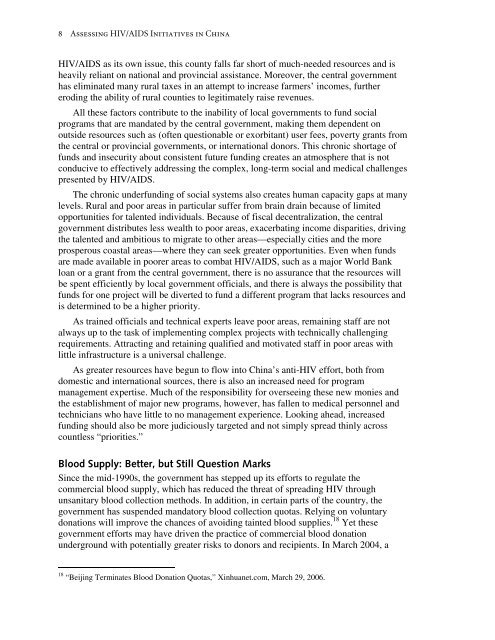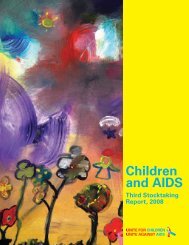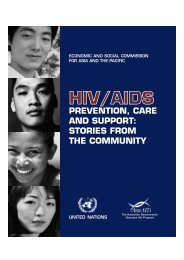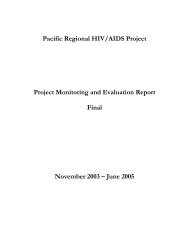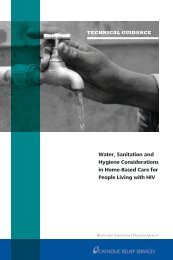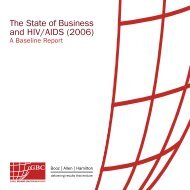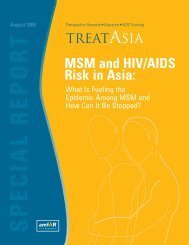Assessing HIV/AIDS Initiatives in China - Center for Strategic and ...
Assessing HIV/AIDS Initiatives in China - Center for Strategic and ...
Assessing HIV/AIDS Initiatives in China - Center for Strategic and ...
Create successful ePaper yourself
Turn your PDF publications into a flip-book with our unique Google optimized e-Paper software.
8 <strong>Assess<strong>in</strong>g</strong> <strong>HIV</strong>/<strong>AIDS</strong> <strong>Initiatives</strong> <strong>in</strong> Ch<strong>in</strong>a<br />
<strong>HIV</strong>/<strong>AIDS</strong> as its own issue, this county falls far short of much-needed resources <strong>and</strong> is<br />
heavily reliant on national <strong>and</strong> prov<strong>in</strong>cial assistance. Moreover, the central government<br />
has elim<strong>in</strong>ated many rural taxes <strong>in</strong> an attempt to <strong>in</strong>crease farmers’ <strong>in</strong>comes, further<br />
erod<strong>in</strong>g the ability of rural counties to legitimately raise revenues.<br />
All these factors contribute to the <strong>in</strong>ability of local governments to fund social<br />
programs that are m<strong>and</strong>ated by the central government, mak<strong>in</strong>g them dependent on<br />
outside resources such as (often questionable or exorbitant) user fees, poverty grants from<br />
the central or prov<strong>in</strong>cial governments, or <strong>in</strong>ternational donors. This chronic shortage of<br />
funds <strong>and</strong> <strong>in</strong>security about consistent future fund<strong>in</strong>g creates an atmosphere that is not<br />
conducive to effectively address<strong>in</strong>g the complex, long-term social <strong>and</strong> medical challenges<br />
presented by <strong>HIV</strong>/<strong>AIDS</strong>.<br />
The chronic underfund<strong>in</strong>g of social systems also creates human capacity gaps at many<br />
levels. Rural <strong>and</strong> poor areas <strong>in</strong> particular suffer from bra<strong>in</strong> dra<strong>in</strong> because of limited<br />
opportunities <strong>for</strong> talented <strong>in</strong>dividuals. Because of fiscal decentralization, the central<br />
government distributes less wealth to poor areas, exacerbat<strong>in</strong>g <strong>in</strong>come disparities, driv<strong>in</strong>g<br />
the talented <strong>and</strong> ambitious to migrate to other areas—especially cities <strong>and</strong> the more<br />
prosperous coastal areas—where they can seek greater opportunities. Even when funds<br />
are made available <strong>in</strong> poorer areas to combat <strong>HIV</strong>/<strong>AIDS</strong>, such as a major World Bank<br />
loan or a grant from the central government, there is no assurance that the resources will<br />
be spent efficiently by local government officials, <strong>and</strong> there is always the possibility that<br />
funds <strong>for</strong> one project will be diverted to fund a different program that lacks resources <strong>and</strong><br />
is determ<strong>in</strong>ed to be a higher priority.<br />
As tra<strong>in</strong>ed officials <strong>and</strong> technical experts leave poor areas, rema<strong>in</strong><strong>in</strong>g staff are not<br />
always up to the task of implement<strong>in</strong>g complex projects with technically challeng<strong>in</strong>g<br />
requirements. Attract<strong>in</strong>g <strong>and</strong> reta<strong>in</strong><strong>in</strong>g qualified <strong>and</strong> motivated staff <strong>in</strong> poor areas with<br />
little <strong>in</strong>frastructure is a universal challenge.<br />
As greater resources have begun to flow <strong>in</strong>to Ch<strong>in</strong>a’s anti-<strong>HIV</strong> ef<strong>for</strong>t, both from<br />
domestic <strong>and</strong> <strong>in</strong>ternational sources, there is also an <strong>in</strong>creased need <strong>for</strong> program<br />
management expertise. Much of the responsibility <strong>for</strong> oversee<strong>in</strong>g these new monies <strong>and</strong><br />
the establishment of major new programs, however, has fallen to medical personnel <strong>and</strong><br />
technicians who have little to no management experience. Look<strong>in</strong>g ahead, <strong>in</strong>creased<br />
fund<strong>in</strong>g should also be more judiciously targeted <strong>and</strong> not simply spread th<strong>in</strong>ly across<br />
countless “priorities.”<br />
Blood Supply: Better, but Still Question Marks<br />
S<strong>in</strong>ce the mid-1990s, the government has stepped up its ef<strong>for</strong>ts to regulate the<br />
commercial blood supply, which has reduced the threat of spread<strong>in</strong>g <strong>HIV</strong> through<br />
unsanitary blood collection methods. In addition, <strong>in</strong> certa<strong>in</strong> parts of the country, the<br />
government has suspended m<strong>and</strong>atory blood collection quotas. Rely<strong>in</strong>g on voluntary<br />
donations will improve the chances of avoid<strong>in</strong>g ta<strong>in</strong>ted blood supplies. 18 Yet these<br />
government ef<strong>for</strong>ts may have driven the practice of commercial blood donation<br />
underground with potentially greater risks to donors <strong>and</strong> recipients. In March 2004, a<br />
18 “Beij<strong>in</strong>g Term<strong>in</strong>ates Blood Donation Quotas,” X<strong>in</strong>huanet.com, March 29, 2006.


